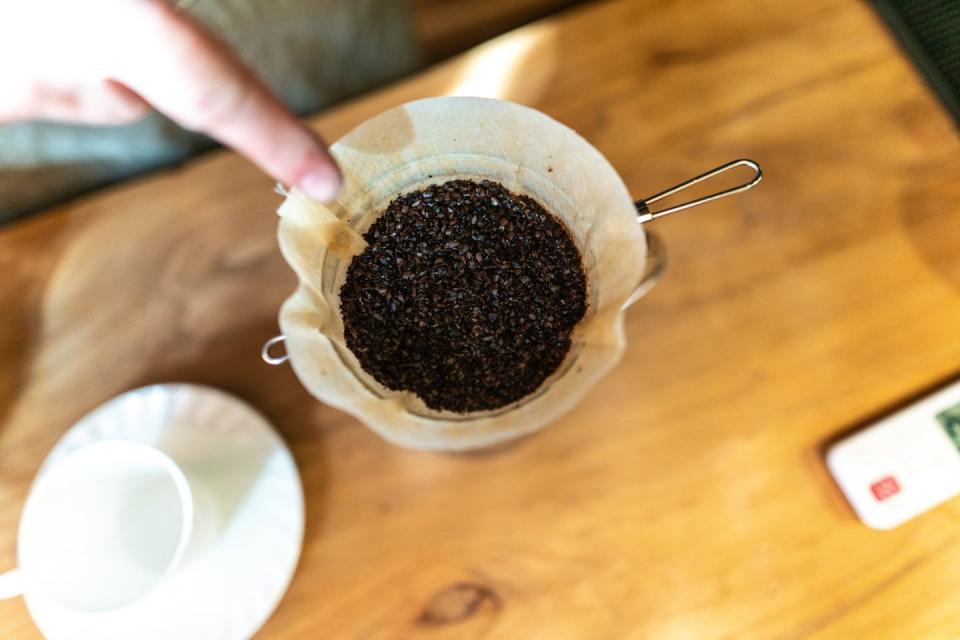There Are So Many Natural Uses for Coffee Grounds in Your Garden
Anyone who's an avid coffee drinker knows that it doesn't take long to go through a bag of coffee. Ree Drummond says that on some days, she drinks up to four cups! If you're brewing a pot a day, you probably have more leftover coffee grounds than you know what to do with. Instead of throwing them away the next time you make your morning cup, save them! You might not realize it, but you can actually use coffee grounds in your garden for a natural fertilizer packed with minerals and nutrients. (While we're at it, did you know you can reuse eggshells in your garden too?)
But with so many different types of coffee, what's safe to use and what could actually hurt your plants? And should you garden with fresh or used grounds? You might have a lot of questions when it comes to gardening with coffee grounds. Luckily for you, we have the answers on everything you wanted to know about how to reuse coffee grounds on your veggies, flowers, and more.
How can you use coffee grounds in your garden?
So you've decided to reuse your old coffee grounds to help your plants thrive—hooray! Here are a handful of different ways to incorporate used coffee grounds into your garden or even indoor plants to keep them happy and healthy. Just make sure they're used coffee grounds—brewing actually helps break them down and release more nutrients!
Fertilizer
For Jim and Mary Competti of Old World Garden Farms in Nashport, Ohio, used coffee grounds are an easy natural fertilizer. When planting, they put a sprinkling of grounds in each hole along with crushed eggshells. They also add them to the top of flower beds and veggie gardens for a nice slow-release of nutrients into the soil as the grounds break down.
Don't use flavored coffee or anything with additives—you never know what's really inside! Regular coffee is best, whether it's a normal brew or espresso.
"Coffee grounds are one of the best sources of nitrogen and that's why they're so vital to vegetable plants," Jim explains. Nitrogen is extremely important for plants because it's a key component of chlorophyll, which helps them photosynthesize. Having soil that's nitrogen-rich will help your vegetables produce and your flowers bloom.
Compost Pile
Another easy way to repurpose your morning brew is to toss the grounds into your compost pile. Coffee grounds are a great organic ingredient to add to your heap, along with the filters!

"Coffee grounds are incredible in a compost pile, because they heat up the pile and really provide a lot of power to it," says Jim. He and Mary usually add coffee grounds directly to their plants in the warmer months but will add them to their compost instead during the winter. It's a great way to get an extra boost of nitrogen into your compost which you can later use for planting.
Natural Pesticide
Sprinkling coffee grounds on your soil can also deter slugs and snails. The abrasive material of the coffee could keep these pests at bay because of their soft underbellies. It's not a foolproof method, but might help cut down on these pesky plant eaters!
Houseplants
If you also have lots of indoor plants, use these tips on your houseplants too! Because coffee grounds gradually break down, they'll give hanging plants and any other indoor varieties a long-lasting boost of energy.

"Every time you're watering, those coffee grounds are releasing a little bit more nitrogen. It has a slow release that really helps plants," explains Jim. Just add them right on top of the soil.
How can you save coffee grounds for gardening?
One issue you might run into is that your wet grounds could get moldy when saved in a container. And if you don't have a compost pile, you might not know what to do with excess grounds!
To avoid them molding, you can simply store your used coffee grounds in the freezer until you're ready to use them. If you have too much to know what to do with, local farms and community gardens might be happy to accept a donation!

